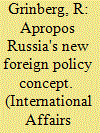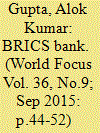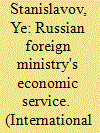|
|
|
Sort Order |
|
|
|
Items / Page
|
|
|
|
|
|
|
| Srl | Item |
| 1 |
ID:
120547


|
|
|
|
|
| Publication |
2013.
|
| Summary/Abstract |
THE FAST CHANGING international situation requires Russia's flexible and timely reaction to the new challenges and threats to its security that arise in the process of the constant evolution of the entire system of modern international relations. At the same time, the Russian Federation, too, is in the process of transformation; it is acquiring new possibilities for an effective response to these challenges and threats; the structure of its national security interests is changing, which should find its reflection in Russia's new foreign policy concept. It is therefore not surprising that among the first decrees V.V. Putin signed after his inauguration as the president of Russia is the decree "On Measures to Ensure the Realization of the Russian Federation's Foreign Policy Course" that instructed the RF Foreign Ministry to present a new draft of the RF foreign policy concept. This will be the country's fourth foreign policy concept since the disintegration of the USSR 21 years ago.
|
|
|
|
|
|
|
|
|
|
|
|
|
|
|
|
| 2 |
ID:
140617


|
|
|
|
|
| Summary/Abstract |
International economic order has always remained biased and discriminatory on account of ‘balance of trade’ being always in favour of developed world. The difference between the developed and the underdeveloped countries grew sharper with the rolling of years in the post-second world war era. While the developed countries made further progress, the condition of under-developed countries did not show any improvement. Consequently, the hiatus between the developed and the under-developed countries went on increasing. The developing countries attributed this to the prevalent international economic order established with the instrumentalities of General Agreement on Tariffs and Trade (GFTT), the International Monetary Fund (IMF), and the International Bank for Reconstruction and Development (World Bank or IBRD).
|
|
|
|
|
|
|
|
|
|
|
|
|
|
|
|
| 3 |
ID:
184991


|
|
|
|
|
| Summary/Abstract |
In the last two decades, the rapid growth of many African economies has coincided with deepening commercial and political ties with China and a re-emergence of perilous indebtedness. US administrations have warned that Beijing is ensnarling Africa in debt to gain political leverage and force African states to cede strategic assets to China. The charge that China is uniquely responsible for Africa’s heavy debt is also shaping the flagship debt initiatives of the World Bank and the IMF. An analysis of the theoretical assumptions underpinning the ‘debt-trap’ narrative and the empirical evidence indicates that the preoccupation with China’s role is misguided, and is in fact rendering it harder to service and relieve African debt. Furthermore, framing the African debt problem in terms of great-power rivalry obscures structural features of the international financial system that are far more consequential in shaping the liquidity and solvency of African states.
|
|
|
|
|
|
|
|
|
|
|
|
|
|
|
|
| 4 |
ID:
107468


|
|
|
|
|
| Publication |
2011.
|
| Summary/Abstract |
T
he prospect of cleaning and decontaminating a U.S. city after a wide-area biological attack is a daunting challenge.
Ten years after the anthrax letter attacks of 2001, the U.S. is still striving to understand and prepare for biological
remediation. As evidenced by the Amerithrax attacks, biological clean-up efforts are inherently time-consuming and costly.
Yet, the 2001 remediation response, which involved only a handful of heavily contaminated buildings, would pale in
comparison to a wide-area anthrax attack involving thousands of contaminated properties and outdoor spaces.
Faced with this challenge, policymakers and public of?cials are working to reduce the time and cost of remediation, to
limit public health risk, and to minimize long-term economic damage from such an event.
This special feature on biological remediation highlights the recent work and ?ndings of the Interagency Biological
Restoration Demonstration program (IBRD), a 4-year program jointly managed and funded by the Department of
Homeland Security's Science and Technology Directorate (DHS S&T) and the Department of Defense's (DoD) Defense
Threat Reduction Agency (DTRA). The program is aimed at reducing the amount of time and resources needed to recover
from an intentional wide-area urban release of Bacillus anthracis.
Topics for this special feature include regional and national recovery frameworks, the role of the private sector in
decontamination, the behavior of aerosolized B. anthracis, recommended approaches to decontamination for indoor and
outdoor spaces, and disposal of anthrax-contaminated waste. This feature is not intended to be a comprehensive review of
the work done under IBRD. Instead, it highlights some of IBRD's major accomplishments and ?ndings over the past 4
years of the project. This feature represents the ?rst publication of IBRD materials on remediation planning and response
frameworks, and the ?rst time that the public will have ready, open access to the results of IBRD remediation studies.
|
|
|
|
|
|
|
|
|
|
|
|
|
|
|
|
| 5 |
ID:
138067


|
|
|
|
|
| Summary/Abstract |
SEPTEMBER 7, 2014 was the 70th anniversary of the establishment of the Economic Cooperation Department (ECD) of the Ministry of Foreign Affairs (at that time, the USSR People's Commissariat for Foreign Affairs), a specialized unit tasked with the elaboration of state economic matters of international importance. The first head of the Economic Cooperation Department was Vladimir Sergeevich Gerashchenko.
|
|
|
|
|
|
|
|
|
|
|
|
|
|
|
|
| 6 |
ID:
029918


|
|
|
|
|
| Publication |
Massachusetts, Martinus Nijhaff Publishing, 1980.
|
| Description |
xii, 269p
|
| Series |
Series on the development of societives
|
| Standard Number |
0898380421
|
|
|
|
|
|
|
|
|
|
|
|
Copies: C:1/I:0,R:0,Q:0
Circulation
| Accession# | Call# | Current Location | Status | Policy | Location |
| 024229 | 332.1532/VAN 024229 | Main | On Shelf | General | |
|
|
|
|
|
|
|
|
|